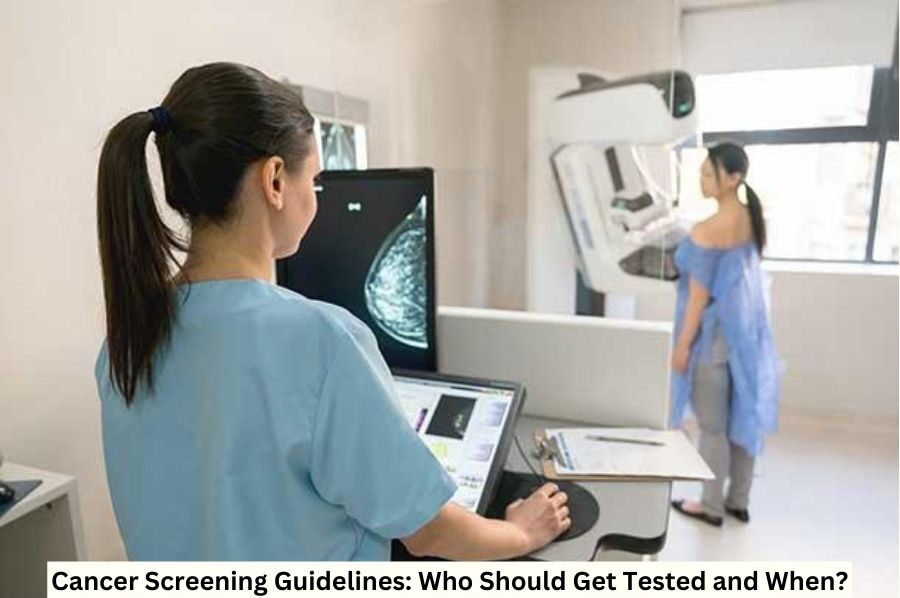BLOG
Cancer Screening Guidelines: Who Should Get Tested and When?

Cancer is a formidable health challenge, but early detection can significantly improve treatment outcomes. Screening tests can identify cancer before symptoms appear, offering a better chance of successful treatment. However, guidelines on who should get tested and when can be confusing. This blog will clarify the current cancer screening guidelines, ensuring you understand when and why to get tested.
Understanding Cancer Screening
Cancer screening involves tests and exams used to detect cancer in people who have no symptoms. These tests can find cancer at an early stage, making treatment easier and more effective. Various types of cancer have different screening guidelines based on risk factors such as age, gender, family history, and lifestyle.
Breast Cancer Screening
Who Should Get Tested?
Breast cancer is one of the most common cancers among women. The primary screening test is a mammogram, an X-ray of the breast.
- Women aged 40 to 44: Optional annual mammograms.
- Women aged 45 to 54: Annual mammograms recommended.
- Women aged 55 and older: Mammograms every two years or continue yearly screening.
Women with a higher risk due to family history, genetic factors, or other reasons may need to start screening earlier and have additional tests such as MRI.
Cervical Cancer Screening
Who Should Get Tested?
Cervical cancer screening is crucial for early detection and involves Pap tests and HPV tests.
- Women aged 21 to 29: Pap test every three years.
- Women aged 30 to 65: Pap test combined with HPV test every five years, or Pap test alone every three years.
- Women over 65: Screening can be stopped if they have had regular screenings in the past 10 years with no significant abnormalities.
Women with a history of cervical cancer, a weakened immune system, or exposure to diethylstilbestrol (DES) before birth may need more frequent screening.
Colorectal Cancer Screening
Who Should Get Tested?
Colorectal cancer screening typically involves colonoscopy, stool tests, and other methods.
- Adults aged 45 to 75: Regular screening is recommended.
- High-sensitivity fecal occult blood test (FOBT): Annually.
- Stool DNA test: Every three years.
- Colonoscopy: Every 10 years.
- Flexible sigmoidoscopy: Every five years.
People with a higher risk, such as those with a family history of colorectal cancer, inflammatory bowel disease, or genetic syndromes, may need to begin screening before age 45 and have more frequent tests.
Prostate Cancer Screening
Who Should Get Tested?
Prostate cancer screening involves the prostate-specific antigen (PSA) test and sometimes a digital rectal exam (DRE).
- Men aged 50 and over: Discuss with your doctor about the potential benefits and risks of PSA testing.
- Men at higher risk: African American men and men with a family history of prostate cancer should discuss screening with their doctor at age 45.
- Men at even higher risk: Those with multiple family members affected by prostate cancer should start discussions at age 40.
Screening decisions for prostate cancer are often based on individual risk factors and personal preferences.
Lung Cancer Screening
Who Should Get Tested?
Lung cancer screening is primarily recommended for high-risk individuals using a low-dose CT scan (LDCT).
- Adults aged 50 to 80: Annual screening for those with a 20 pack-year smoking history who currently smoke or have quit within the past 15 years.
- High-risk individuals: Those with a history of heavy smoking, occupational exposure, or family history should consult their doctor about the necessity of screening.
Skin Cancer Screening
Who Should Get Tested?
Skin cancer screening involves visual examinations by a healthcare provider and self-exams.
- Adults of all ages: Regular self-exams for new or changing moles and skin lesions.
- High-risk individuals: Those with a history of skin cancer, atypical moles, or a family history of skin cancer should have regular check-ups with a dermatologist.
General Recommendations
Factors Influencing Screening Decisions
- Family History: Individuals with a family history of cancer may need earlier or more frequent screenings.
- Genetic Factors: Genetic testing for BRCA1, BRCA2, and other mutations can influence screening guidelines.
- Lifestyle: Smoking, diet, and exposure to carcinogens can affect cancer risk and screening recommendations.
- Ethnicity: Some ethnic groups have higher risks for certain cancers, necessitating tailored screening guidelines.
Discuss With Your Doctor
It’s crucial to discuss your personal risk factors and family history with your healthcare provider. They can help you understand which screenings are appropriate for you and when to start them. Early detection through regular screening can save lives by catching cancer before it progresses.
Conclusion
Cancer screening is a vital tool in the fight against cancer, offering the chance for early detection and better treatment outcomes. Understanding who should get tested and when can help you take proactive steps in managing your health. Regular consultations with your healthcare provider ensure that you follow the most suitable screening guidelines for your individual needs. Prioritize your health by staying informed and proactive about cancer screening.

